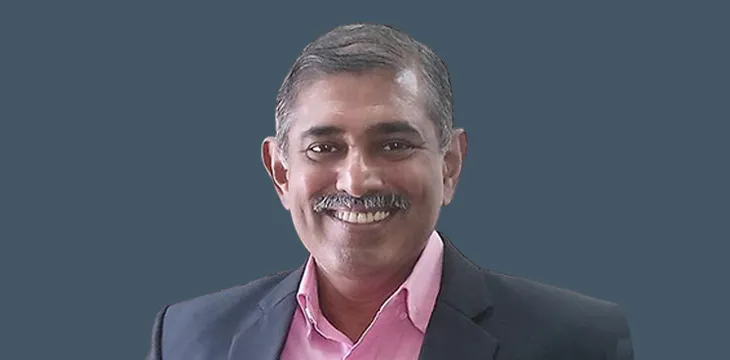|
Getting your Trinity Audio player ready...
|
https://www.youtube.com/watch?v=PZMvkJxFaEI
When it comes to passion for IPv6 technology, there are perhaps few people who can match up to Sureswaran Ramadass. It’s only to be expected; he is, after all, the chairman of the IPv6 Forum in Malaysia and professor emeritus at the Malaysia University of Science and Technology.
Stepping into a room specially designed for video conferencing, Prof. Ramadass takes the opportunity to remotely adjust his camera’s framing. This was clearly a man who is used to technology and who has spent his career advocating for the advancement of human technology to new heights.
In just a few minutes, the interview is underway, with the professor speaking to Jon Southurst on The Bitcoin Bridge about the topic that he knows best.
Making Asia’s biggest push
Prof. Ramadass shares that his background has always been technical. Years ago, when he started his Ph.D. work, one of the main founders of IPv6 in the region urged him to focus on the technology and help push it in the region.
Having practically no experience in IPv6 technology, the professor said that he had misgivings at first, but he eventually stepped into the world that would be the center of his career for years to come.
“What we did, we made IPv6 one of the main pushes to come out of Asia,” Prof. Ramadass said. “So while a lot of internet technologies came out of Europe or the U.S., we wanted IPv6 to be driven by Asia.”
Looking at how far the technology has come, the professor says they have been quite successful in their initiative. He says that Asian countries did take the lead in IPv6—and they still do.
Another marker of success for Prof. Ramadass is the growing acceptance of IPv6. He explains that people are starting to understand that IPv6 is not competing with IPv4, and that it’s simply a growth phase of the technology. One factor that’s helping push the new technology is that it’s free while IPv4 is starting to get costly because of its scarcity.
“It’s kind of obvious which side to choose,” Prof. Ramadass said. “You get this new venture, new organizations getting in. That is the correct choice for that.”
‘It’s only for you for the rest of your life’
The transition into the new era of the Internet requires a shift in the people’s mindsets as well. Prof. Ramadass likens it to coders learning a new programming language.
“You have to clear your mindset thinking of the old paradigm of programming and think of the new paradigm of programming,” he explained. “Same thing with IPv4 or IPv6. IPv4 is a little more simplistic, straightforward in the sense of implementation. IPv6 has a lot more options.”
These options, of course, are referring to IPv6’s larger address pool. Unlike IPv4, whose options are dwindling, IPv6 has exponentially more available addresses. In fact, there are enough options that it’s possible to give everyone in the world—for generations to come—their own unique address.
“I could now have an IPv6 global address, and this time it can belong to me,” Prof. Ramadass said. “So wherever I go, whichever company I move to, it’s almost like someone saying, I’m giving you your life. Lifelong IPv6 address and this is your life. No one can take it away from you, and it’s only for you for the rest of your life. Isn’t that cool?”
A progressive internet economy
As far as the internet economy is concerned, the IPv6 Forum Education Chairman is nothing short of amazed. He recalled a time not too long ago when managing finances was not such an easy task.
“I remember the day when I went to the U.S. to study. We had to get traveller’s cheques,” Prof. Ramadass shared with The Bitcoin Bridge. “We had to spend big. We had to put our names on it and carry it to a bank in the U.S., and then the guy would verify it and then translate it into cash. And if those cheques got stolen? Guess what, you’ve lost the money.”
Another thing that the professor has high praise for is the potential of digital currency. He believes that digital currency can bring a revolution to the world of internet finance, making it more secure. However, he explained that people need to start seeing Bitcoin as more than just a trading option and to look at the bigger picture of the cryptocurrency itself.
“I do feel that it’s brought its value to the world. It’s just that people need to know how to use it, how to value it, and how to carry it forward,” Prof. Ramadass said.
In reply, Southurst remarked: “It’s a very similar problem, isn’t it? It’s just a matter of educating and getting people to change their habits.
Catch the full, engaging interview with Prof. Sureswaran Ramadass on The Bitcoin Bridge with Jon Southurst. Watch the full interview on the CoinGeek YouTube channel.
Watch: The BSV Global Blockchain Convention presentation, IPv6-bsed 5G/6G, IoT & Blockchain
https://www.youtube.com/watch?v=dE3Vsbo1NPs

 08-29-2025
08-29-2025 





